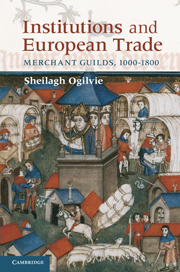Book contents
- Frontmatter
- Contents
- Acknowledgements
- 1 Merchant guilds, efficiency and social capital
- 2 What was a merchant guild?
- 3 Local merchant guilds
- 4 Alien merchant guilds and companies
- 5 Merchant guilds and rulers
- 6 Commercial security
- 7 Contract enforcement
- 8 Principal-agent problems
- 9 Information
- 10 Price volatility
- 11 Institutions, social capital and economic development
- Bibliography
- Index
8 - Principal-agent problems
Published online by Cambridge University Press: 05 June 2012
- Frontmatter
- Contents
- Acknowledgements
- 1 Merchant guilds, efficiency and social capital
- 2 What was a merchant guild?
- 3 Local merchant guilds
- 4 Alien merchant guilds and companies
- 5 Merchant guilds and rulers
- 6 Commercial security
- 7 Contract enforcement
- 8 Principal-agent problems
- 9 Information
- 10 Price volatility
- 11 Institutions, social capital and economic development
- Bibliography
- Index
Summary
Many frauds are committed by travelling partners concerning the goods in a societas or commenda.
(Genoese law code, 1316)I curse fortune when I think of the day on which I got involved with him, not believing that he would be dishonest.
(Gherardino Strozzi writing to Matteo Strozzi concerning a dishonest business associate, Modena, 1426)Do not give money or a consignment [of goods] to an inexperienced man. Even if you know for certain that he is a man of good reputation [akhtibar], ascertain the truth by questioning several people. Only then give him money or credit with a bill [tamasuk] and with witnesses. But [make sure] to write down all your transactions several times.
(Armenian merchant training manual, 1680s)Any merchant trading beyond the scale that can be handled by a single individual has to use other people – agents – to do business on his behalf. This is particularly important in long-distance trade, which can be more efficiently conducted if one trader stays home to manage the local end of the business, while his partners or agents trade abroad, enabling the business to trade simultaneously in multiple locations and diversify its activities.
But once a merchant gets someone else to trade on his behalf, he confronts the principal-agent problem. An agent entrusted with a merchant's capital or wares has an incentive to pursue his own interests at the expense of his principal. If the probability of misconduct by agents is too high, principals will not employ them.
- Type
- Chapter
- Information
- Institutions and European TradeMerchant Guilds, 1000–1800, pp. 315 - 343Publisher: Cambridge University PressPrint publication year: 2011

